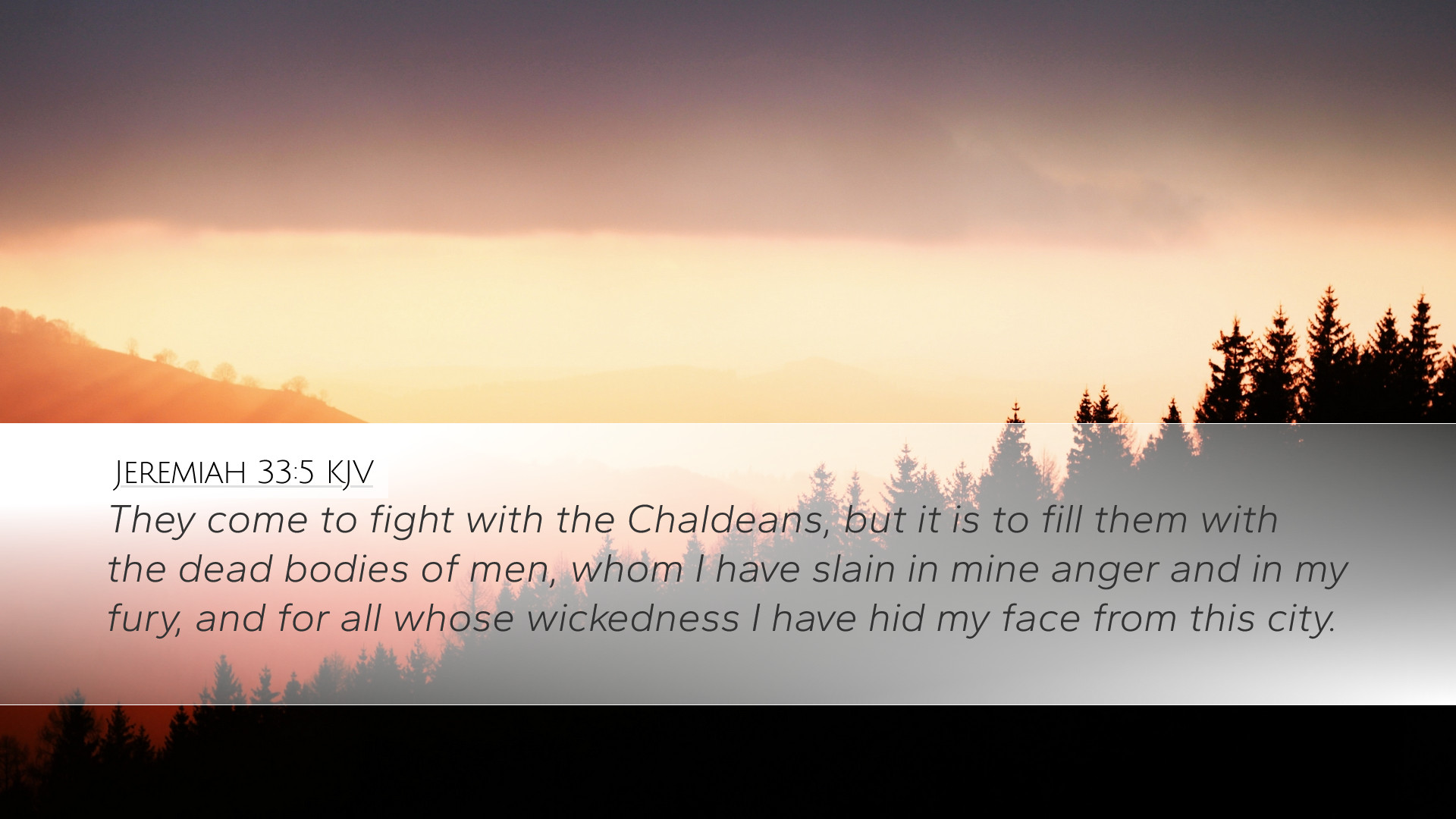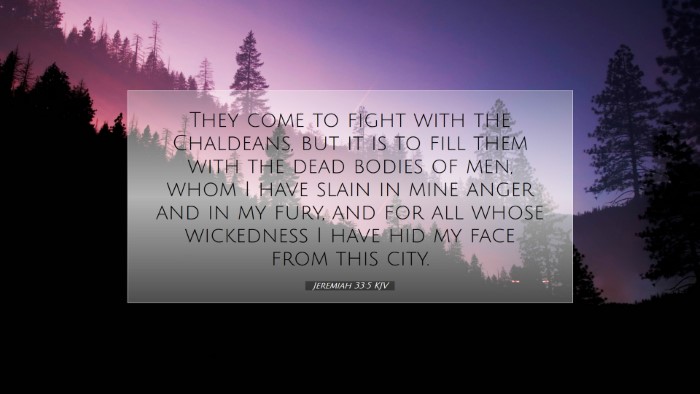Commentary on Jeremiah 33:5
Verse: “They come to fight against the Chaldeans, but it is to fill them with the dead bodies of men whom I have slain in mine anger and in my fury, and for all whose wickedness I have hid my face from this city.” (Jeremiah 33:5)
Introduction
This verse finds itself within the rich tapestry of Jeremiah’s prophecies reflecting God's judgment, mercy, and the eventual restoration of Israel. The profound implications of this text resonate with themes significant to both the faithful and the scholarly reader. By analyzing public domain commentaries—most notably from Matthew Henry, Albert Barnes, and Adam Clarke—we can uncover layers of meaning that aid in a deeper understanding of Jeremiah 33:5.
Contextual Overview
The context surrounding Jeremiah 33:5 is critical for understanding the prophet's intentions. This chapter is a part of a larger narrative where God assures Jeremiah that He will restore Israel despite the terrifying circumstances of war and destruction. The Chaldeans, representing the Babylonians, are in conflict with Jerusalem, and this verse encapsulates God’s judgment on wickedness, juxtaposed with the assurance of restoration.
Insights from Commentaries
Matthew Henry's Commentary
Matthew Henry emphasizes that the verse starkly outlines the divine decree that surrounds warfare and judgment. He notes that the "dead bodies" represent the dire consequences of disobedience and the severe nature of God’s anger. Henry elaborates that the killing is not casual but is a direct result of divine wrath against evil.
Moreover, Henry interprets this event as part of God’s righteous procedure; it signifies both judgment and an undeniable revelation of God’s presence, even in wrath. The hiding of God's face from the city illustrates the separation that sin creates between humanity and the divine.
Albert Barnes' Notes on the Bible
Albert Barnes provides a detailed analysis of the phrase "I have slain in mine anger." He highlights the sovereignty of God in dealing with sin, noting that such actions are a manifestation of His just nature. Barnes underscores the connection between God's anger and the resulting calamities faced by the people, suggesting that these events serve a dual purpose: punishment for wickedness and a call for repentance.
Furthermore, he points out that "hid my face" connotes abandonment due to sin, but also an opportunity for redemption when the people later turn back to God. Barnes conveys a message of hope as he urges the readers to recognize God’s overarching plan for restoration despite the trials.
Adam Clarke's Commentary
Adam Clarke provides a comprehensive exegesis on this verse, focusing particularly on the metaphorical implications of death and desolation. Clarke remarks that the image of "dead bodies" serves not only as a literal consequence of warfare but also as a metaphor for spiritual death and decay within the nation.
Clarke emphasizes that the passage reflects not merely physical destruction but also the spiritual ramifications of Israel’s rebellion against God. His commentary suggests that the fierce wrath God demonstrates should be seen as an invitation to align with His will and ultimately leads the faithful to reconsider their paths and repent for restoring the covenant relationship with Him.
Theological Implications
Theological reflections stemming from Jeremiah 33:5 reveal that divine judgment serves as a precursor to grace. The historical context of Israel’s feel of despair amidst Babylonian conquest is paralleled in the broader narrative of the human condition—where sin leads to separation from God’s favor. This is where the hope of restoration becomes salient, as seen in the following verses, reinforcing the notion that God desires reconciliation over destruction.
Application for Pastors and Theologians
For pastors and scholars, Jeremiah 33:5 is a summons to address the moral and spiritual conditions of today’s church in light of God’s holiness. The commentary insights suggest that contemporary society mirrors ancient Israel's rebellion against divine norms. Effective preaching and teaching must include the realities of God's judgment balanced with His desire for mercy.
Conclusion
In summary, Jeremiah 33:5 compels readers to acknowledge the weight of sin and the truth of divine judgment while fostering hope through God's willingness to restore. The valuable insights drawn from Matthew Henry, Albert Barnes, and Adam Clarke provide a solid foundation for understanding this profound scripture. Pastors, students, and theologians alike are encouraged to dig deeper into the text, extracting its timeless truths for application in pastoral care, biblical teaching, and personal reflection.


